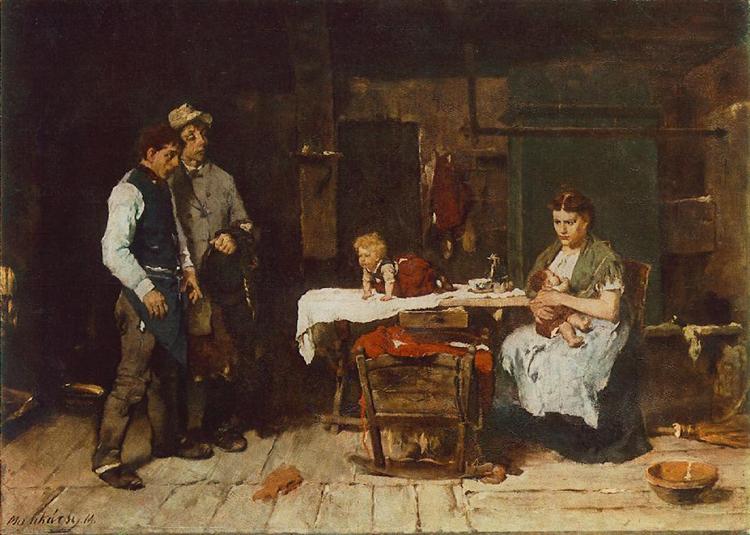Description
The work "intoxicating husband", created in 1873 by Mihály Mockámsy, remarkably captures the technical skill and social sensitivity of the Hungarian artist. This painting presents a domestic scene full of tension and emotionality, where the characters become vehicles of a rich and complex visual narrative.
In the composition, the viewer is taken to an intimate atmosphere, a modest interior that contrasts with the emotional intensity of the characters. In the center of painting, The male protagonist, whose countenance denotes the ravages of alcohol, is sitting, with an attitude of abandonment. His body seems to have dropped heavily in the chair, a clear representation of drunkenness. The woman, presumably her wife, emerges as a contrast figure, wrapped in a mixture of resignation and strength, characteristics that are reflected in her rigid posture and in the fixed look in the uncertain horizon.
Mockacsy's domain over the use of color and light is evident in "intoxicating husband." The chromatic palette dominated by ocher and terrible tones not only provides tangible realism, but also enhances the feeling of sadness and desolation. The details in the faces and clothing of the characters, as well as in the daily objects scattered on the scene, show the meticulous attention of the painter to everyday reality and his ability to capture the essence of their subjects.
When observing the painting as a whole, you can feel a underlying social criticism. The choice of such a descriptive title and the representation of a disturbing domestic moment invite the viewer to reflect on the consequences of alcohol abuse and its impact on family dynamics. It is a window to the internal and external struggles of the working class of the nineteenth century, a look without ornaments for the rawness of everyday life.
Mihály Mockámsy, known for her mastery in realism, not only stood out for her technical ability, but also for her ability to infuse her works with a powerful and emotional narrative. Similar works in his canon, such as "the last day of a convicted" or "cemetery in the morning", evidence a constant concern for social and human issues, a search to portray not only the visible but also the invisible, those nuances of the human condition that hide behind each daily gesture.
Compared to other realistic contemporaries, Mockámsy presents a particular sensitivity towards their characters, providing them with a palpable humanity that transcends the mere formalism. His ability to transform ordinary scenes into powerful meditations on life and society assures him a prominent place in art history. "Broken husband" is an exquisite example of how art can serve as a critical mirror of reality, undressing the internal and external struggles of those times, and allowing us, more than a century later, continuing to connect with those universal stories.
KUADROS ©, a famous paint on your wall.
Hand-made oil painting reproductions, with the quality of professional artists and the distinctive seal of KUADROS ©.
Art reproduction service with satisfaction guarantee. If you are not completely satisfied with the replica of your painting, we refund your money 100%.

